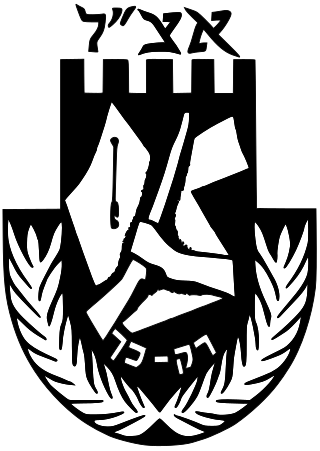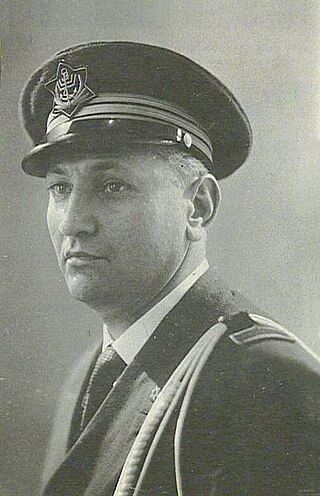Related Research Articles

The Irgun, or Etzel, was a Zionist paramilitary organization that operated in Mandate Palestine and then Israel between 1931 and 1948. It was an offshoot of the older and larger Jewish paramilitary organization Haganah. The Irgun has been viewed as a terrorist organization or organization which carried out terrorist acts.

Zionism is a nationalist movement that emerged in the 19th century to espouse support for the establishment of a homeland for the Jewish people in Palestine, a region roughly corresponding to the Land of Israel in Jewish tradition. Following the establishment of Israel, Zionism became an ideology that supports "the development and protection of the State of Israel".

Ze'ev Jabotinsky was a Revisionist Zionist leader, author, poet, orator, soldier, and founder of the Jewish Self-Defense Organization in Odesa.

The 1920 Nebi Musa riots or 1920 Jerusalem riots took place in British-controlled part of Occupied Enemy Territory Administration between Sunday, 4 April, and Wednesday, 7 April 1920 in and around the Old City of Jerusalem. Five Jews and four Arabs were killed, and several hundred were injured. The riots coincided with and are named after the Nebi Musa festival, which was held every year on Easter Sunday, and followed rising tensions in Arab-Jewish relations. The events came shortly after the Battle of Tel Hai and the increasing pressure on Arab nationalists in Syria in the course of the Franco-Syrian War.

The Betar Movement, also spelled Beitar (בית"ר), is a Revisionist Zionist youth paramilitary organization founded in 1923 in Riga, Latvia, by Vladimir (Ze'ev) Jabotinsky. It was one of several right-wing youth movements that arose at that time and adopted special salutes and uniforms.

Revisionist Zionism is a form of Zionism which is characterized by territorial maximalism. Revisionist Zionism promoted expansionism and the establishment of a Jewish majority on both sides of the Jordan River.
Hatzohar, full name Brit HaTzionim HaRevizionistim, was a Revisionist Zionist organization and political party in Mandatory Palestine and newly independent Israel.

Havlagah was the strategic policy of the Yishuv during the 1936–1939 Arab revolt in Palestine. It called for Zionist militants to abstain from engaging in acts of retaliatory violence against Palestinian Arabs in the face of Arab attacks against Palestinian Jews, and instead encouraged the Jewish community to respond to the attacks through non-violent means, such as by fortifying their settlements. The policy was supported by the Yishuv's political leadership and many left-wing Zionists. It was adopted by Haganah, the main Zionist paramilitary in Mandate Palestine, as an official operational strategy. On the other hand, Irgun, Lehi, and other like-minded Zionist paramilitaries rejected the policy and engaged in indiscriminate violence against the Arab community.

Abba Ahimeir was a Russian-born Jewish journalist, historian, and political activist. One of the ideologues of Revisionist Zionism, he was the founder of the Revisionist Maximalist faction of the Zionist Revisionist Movement (ZRM) and of the clandestine Brit HaBirionim.
Joseph Schechtman was a Russian-born Revisionist Zionist activist and author. He was the author of numerous books of history, biography and works on Zionism.
As an organized nationalist movement, Zionism is generally considered to have been founded by Theodor Herzl in 1897. However, the history of Zionism began earlier and is intertwined with Jewish history and Judaism. The organizations of Hovevei Zion, held as the forerunners of modern Zionist ideals, were responsible for the creation of 20 Jewish towns in Palestine between 1870 and 1897.

The intercommunal conflict in Mandatory Palestine was the civil, political and armed struggle between Palestinian Arabs and Jewish Yishuv during the British rule in Mandatory Palestine, beginning from the violent spillover of the Franco-Syrian War in 1920 and until the onset of the 1948 Arab–Israeli War.

The negation of the Diaspora is a central assumption in many currents of Zionism. The concept encourages the dedication to Zionism and it is used to justify the denial of the feasibility of Jewish emancipation in the Diaspora. Life in the Diaspora would either lead to discrimination and persecution or to national decadence and assimilation. A more moderate formulation says that the Jews as a people have no future without a "spiritual center" in the Land of Israel.
Revisionist Maximalism was a short-lived movement right-wing militant political ideology and Jewish militant ideology which was part of the Brit HaBirionim faction of the Zionist Revisionist Movement (ZRM) created by Abba Ahimeir.

Benzion Netanyahu was an Israeli encyclopedist, historian, and medievalist. He served as a professor of history at Cornell University. A scholar of Judaic history, he was also an activist in the Revisionist Zionism movement, who lobbied in the United States to support the creation of the Jewish state. His field of expertise was the history of the Jews in Spain. He was an editor of the Hebrew Encyclopedia and assistant to Benjamin Azkin, Ze'ev Jabotinsky's personal secretary.

The principal common goal of Zionism was to establish a homeland for the Jewish people. Zionism was produced by various philosophers representing different approaches concerning the objective and path that Zionism should follow.

Captain Jeremiah Halpern was a Revisionist Zionist leader in Palestine who first came to prominence when he served as aide de camp to Ze'ev Jabotinsky in the 1920s when the latter was head of the Haganah in Jerusalem.

The Betar Naval Academy was a Jewish naval training school established in Civitavecchia, Italy in 1934 by the Revisionist Zionist movement under the direction of Ze'ev Jabotinsky, with the agreement of Benito Mussolini. The titular head of the Academy was the Italian maritime scientist Nicola Fusco but Betar leader Jeremiah Halpern ran the School and was its driving force. The Academy trained cadets from all over Europe, Palestine and South Africa and produced some of the future commanders of the Israeli Navy.

Labor Zionism or socialist Zionism refers to the left-wing, socialist variation of Zionism. For many years, it was the most significant tendency among Zionists and Zionist organizations, and was seen as the Zionist sector of the historic Jewish labour movements of Eastern Europe and Central Europe, eventually developing local units in most countries with sizable Jewish populations. Unlike the "political Zionist" tendency founded by Theodor Herzl and advocated by Chaim Weizmann, Labor Zionists did not believe that a Jewish state would be created by simply appealing to the international community or to powerful nations such as the United Kingdom, Germany, or the former Ottoman Empire. Rather, they believed that a Jewish state could only be created through the efforts of the Jewish working class making aliyah to the Land of Israel and raising a country through the creation of a Labor Jewish society with rural kibbutzim and moshavim, and an urban Jewish Proletariat.

Avi Shlaim is an Israeli and British historian. He is one of Israel's "New Historians", a group of Israeli scholars who put forward critical interpretations of the history of Zionism and Israel.
References
- 1 2 3 4 Jabotinsky, Ze'ev (4 November 1923). "The Iron Wall" (PDF).
- ↑ Zionist Freedom Alliance - Ze’ev (Vladimir) Jabotinsky Archived 2007-09-28 at the Wayback Machine
- 1 2 3 Jabotinsky, Ze'ev (11 November 1923). "The Ethics of the Iron Wall" (PDF). Archived from the original (PDF) on 15 November 2013.
- ↑ Taylor, Alan R. (1972-10-01). "THE ZIONIST ENIGMA: TWO ISRAELI INTERPRETATIONS: Simon N. Herman. Israelis and Jews, the Continuity of an Identity./Aharon Cohen. Israel and the Arab World". Journal of Palestine Studies. 2 (1): 138–141. doi:10.2307/2535979. ISSN 0377-919X.
- 1 2 3 4 5 6 Shlaim, Avi (2015). The Iron Wall : Israel and the Arab World. London: Penguin. ISBN 978-0-14-197678-5. OCLC 1004569566.